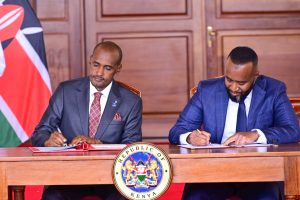Uganda and Kenya have stepped up their push for deeper economic integration with the signing of seven new bilateral agreements between Presidents Yoweri Kaguta Museveni and William Ruto, bringing the total number of cooperation deals between the two East African powerhouses to 25.
The new pacts signed in Nairobi on Wednesday focus on unlocking opportunities in tourism, agriculture, cross-border trade, transport, investment, and aquaculture. 
But beyond paper, the agreements mark a calculated effort to turbocharge regional commerce and build a more connected, investor-friendly East Africa.
State House Uganda described the deals as a “bold reaffirmation” of both countries’ commitment to shared prosperity.
“The signing of these agreements marks a significant step forward in fostering collaboration and economic growth in the region, promising new opportunities for both nations as they work together for a prosperous future,” read a statement from State House.
Among the agreements signed is a unique property rights deal aimed at empowering informal cross-border traders especially women and youth across the Greater Busia Metro from 2025 to 2028. This initiative, observers say, could be a game-changer for grassroots economic resilience along one of East Africa’s busiest trading corridors.
Other MoUs include:
Tourism Cooperation to grow both nations’ travel industries and attract more visitors.
Fisheries and Aquaculture Development, to boost joint ventures in sustainable fish production.
Agricultural and Livestock Collaboration, focusing on increasing food production and market access.
Transport Infrastructure Partnerships, targeting smoother connectivity and logistics.
Standards Bureau Alignment between Kenya’s KEBS and Uganda’s UNBS, to remove technical trade barriers.
Investment Promotion, meant to facilitate joint ventures, innovation, and industrial linkages.
Speaking during a joint press briefing, President Museveni challenged African nations to shift from raw talk to real production and more importantly, to solve the critical issue of markets.
“The more goods and services you produce, the wealthier you become. But a central question remains: who buys what you produce?” he said, calling for honest discussions around demand creation, intra-Africa trade, and industrial growth.
Quoting from a biblical passage, Museveni issued a pointed warning to African leaders.
“They left undone what they ought to have done and did what they ought not to have done.” He stressed that the failure to optimize Africa’s abundant natural and human resources continues to hinder the continent’s transformation.
“East Africa is beginning to awaken,” Museveni added, expressing optimism that the region is now entering a phase of results-driven economic discourse.
On his part, President Ruto emphasized the long-standing brotherhood between Kenya and Uganda and the urgency to expand collaboration across all sectors.
“This occasion reflects the strength of our historical partnership, anchored in common ideals, deep respect, and a shared ambition for regional stability and progress,” he said.
He affirmed that his talks with Museveni spanned wide-ranging areas including infrastructure, trade, energy, security, and integration and that the signed MoUs will deliver “concrete and transformative results” for citizens of both nations.
With 25 cooperation frameworks now in place, Uganda and Kenya appear to be positioning themselves as anchors of a more cohesive East African economy.
Analysts say implementation will be key and if successful, this new chapter could attract more regional and international investment into agriculture, manufacturing, transport, and services.
The deals come as the East African Community (EAC) pushes for accelerated integration under the African Continental Free Trade Area (AfCFTA), offering Uganda and Kenya a wider platform to export goods, share innovation, and co-develop strategic infrastructure.